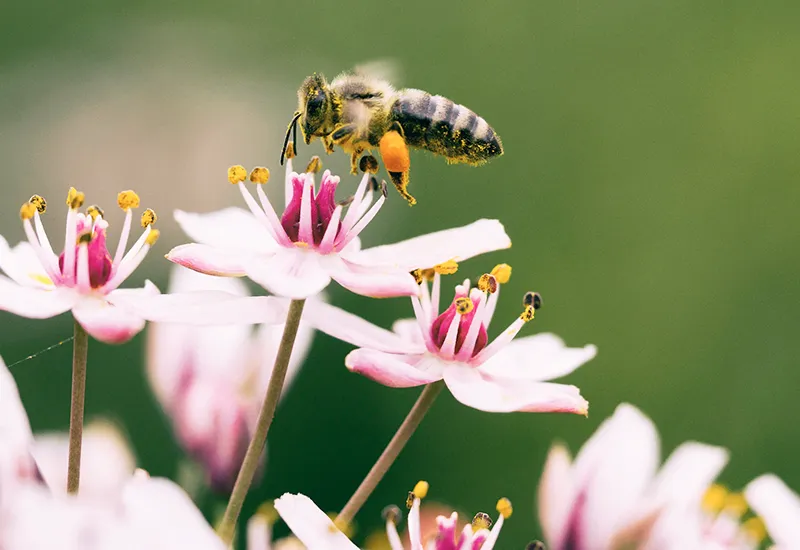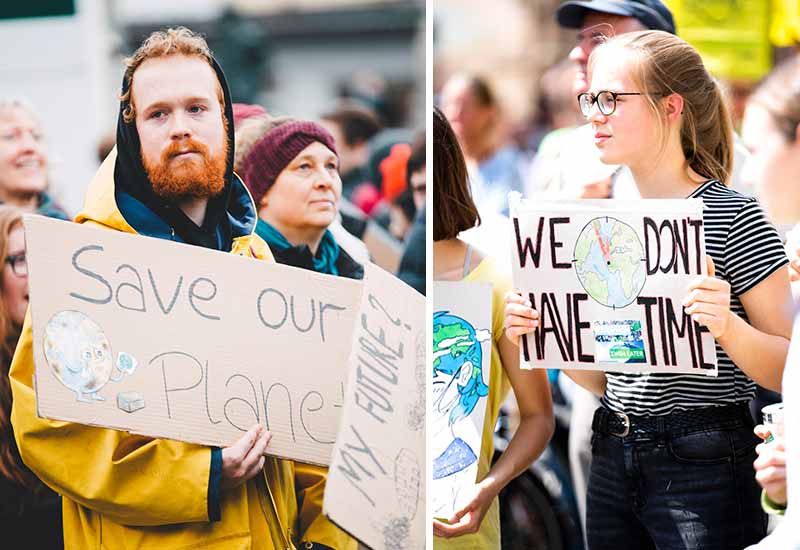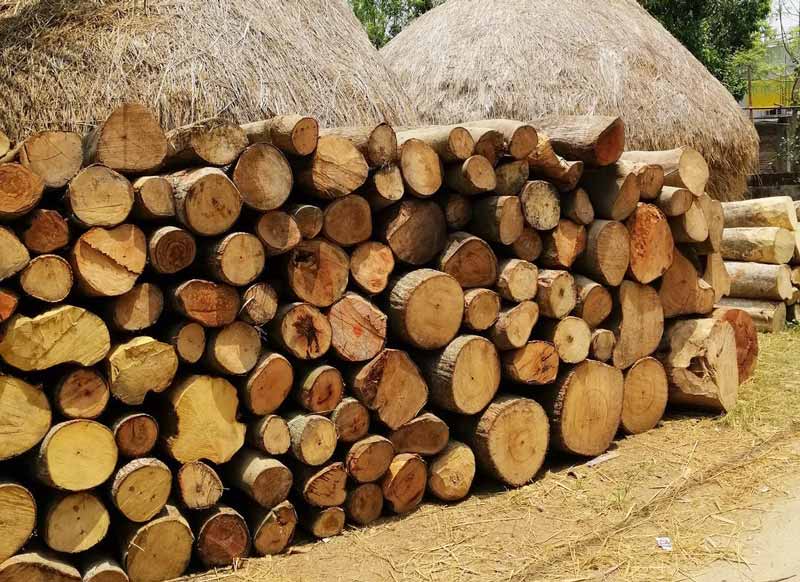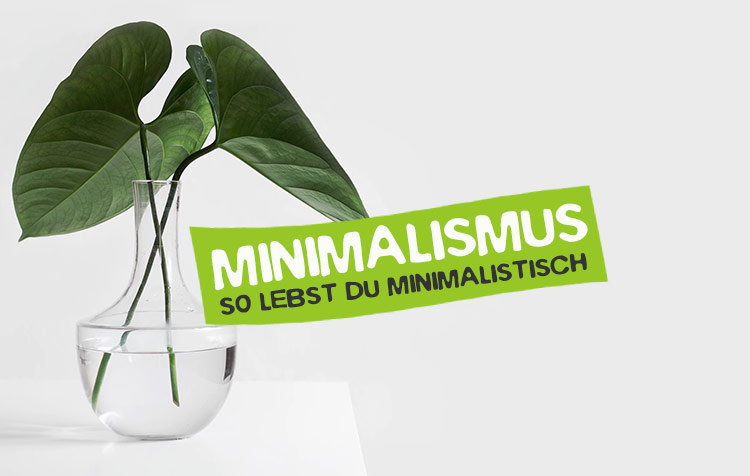You are looking for the most important technical terms about sustainability and their definitions? Then you've come to the right place! Who is against the greatest environmental problems of our time or injustices in our society, constantly learns new technical terms.
In order to always keep an overview and have access to compact knowledge on the topic of sustainability, I have compiled a clear, digital lexicon for you here, in which I summarize all known and new technical terms.
In this glossary you will now learn the most important definitions in alphabetical orderas well as suitable, further-reaching articles, in order to delve deeper into the respective subject matter. Let's go!
If you like you can here directly to the respective initial letter of the technical terms jump:
My please: If you find this wiki helpful and would like to use its content online, I would greatly appreciate a link back to this carefully compiled collection. Thank you for your support!
What Is This Digital Sustainability Glossary All About?
Why I built a "digital encyclopedia" with the most important definitions from the field of sustainability? Because you can understand and solve social and ecological problems much better if you have a holistic understanding of all relevant factors and concepts. The collected technical terms and definitions should help us all not to lose the overview.
I will expand this lexicon directly as soon as I come across further, important technical terms from the world of environmental protection. You are welcome to support me: if an important technical term is missing here, just let me know in the comments.
Notice: I have linked you to more in-depth articles on the corresponding technical term or listed them as further articles.

100+ Essential Sustainability Terms Explained Simply
As promised, you will now find here the most important technical terms around the topic of sustainability and environmental protection. I first got to know many of them myself in the course of my work on CareElite.de. It is simply nice to summarize what I have learned and to constantly expand this overview.
Use the definitions to give yourself a fuller picture about one of the most important political, economic or everyday topics of discussion and conversation.
Sustainability Terms Starting with A
Albedo
The Albedo basically means the percentage of diffusely reflected radiation when incident on a non-self-illuminating and non-reflecting surface. The planetary albedo is the reflectivity of the planet earth.
The darker the surface of the earth, the less radiation can be reflected and the more heat remains on the earth. Thus, the albedo of the Earth also influences global warming.
Species Protection
The protection of species means the Protection and care of wild animal and plant species threatened with extinction. through certain measures. The protection of species is mostly based on ethical or aesthetic principles or can be traced back to ecological findings. Humans are both the threatening and the protecting entity.
Species Extinction
Under the Species Extinction one understands the Extinction of certain animal or plant species. In the public debate, however, this primarily refers to the loss of species due to manmade Environmental degradation and extermination are meant.
Nuclear Phase-Out
When people talk about the nuclear phase-out, they mean the Political decision to close nuclear power plants in the short, medium or long term in order to dispense with nuclear energy for the generation of electricity in the future.
Sustainability Terms Starting with B
Bee Die-Off
Bee mortality refers to the mass death of innumerable bees in a relatively short period of time. Bee mortality is a consequence of industrial land use and, due to reduced Pollination performance of bees also has fatal consequences for human food production and many animal and plant species.
Biodiversity
At Biodiversity is the Diversity of life on earth to understand. This includes the level of diversity of habitats and ecosystems, the level of diversity of animals, plants and organisms, as well as the level of diversity of breeds and varieties of different species living in the wild. Ecosystems, species and genes - the interrelationships between these levels are referred to as functional biodiversity.
Biodegradability
Biodegradability is understood to mean the Ability of organic chemicals to be decomposed biologically, i.e. by living organisms or their enzymes.. Living things, for example, are biodegradable, but petroleum-based plastics are not.
Biomass
Biomass is generally defined as the Mass of organic matter produced by living organisms in a given habitat. is called the biomass. For example, if you consider all living organisms in a lake, they are the biomass of the lake.
Soil Erosion
Under the Soil Erosion one understands the Soil erosion on the surface of the earththat were and are caused by humans. When we talk about soil erosion, we are usually referring to erosion caused by water (e.g. rainwater running off fields) or erosion caused by wind.
Sustainability Terms Starting with C
Carsharing
Car sharing refers to the organized, joint use of motor vehicles. Demand-based usage is billed and paid for, for example, by mileage or minutes of travel.
CO2 Equivalents
A CO2 equivalent (CO2e for short) is a Unit of measurement that makes the effects of all man-made greenhouse gases on the global climate comparable.. This takes into account not only carbon dioxide emissions, but also emissions of other gases that affect the climate, such as methane or nitrous oxide.
Since the gases contribute to the greenhouse effect to different degrees and remain in the earth's atmosphere for different periods of time, the conversion into CO2 equivalents brings the climate effect of the gases down to a common denominator.
CO2 Emissions
CO2 emissions are understood to be Greenhouse gases that result from the combustion of carbon-containing materials such as coal, gasoline, or natural gas.. These combustion processes result in high carbon dioxide emissions, which accumulate in increasing concentrations in the earth's atmosphere and accelerate global warming.
CO2 Offset
With CO2 Offset (also known as CO2 offsetting) is the compensation of greenhouse gas emissions caused by investments in climate protection projects. In this way, emissions are saved elsewhere in order to improve the company's own carbon footprint.
Cradle to Cradle
The cradle-to-cradle concept aims to use the intelligence of natural systems to develop new products, enabling the peaceful coexistence of the economy and nature. Corresponding products are either used as nutrients in biological cycles recycled or permanently incorporated as "technical nutrients" in technical circuits held.
Sustainability Terms Starting with D
Three Pillars Model of Sustainability
The three-pillar model of sustainable development (often referred to as the Sustainability Triangle denoted) means the Principle that sustainable development can only be achieved through the simultaneous and equal implementation of environmental, economic and social objectives. Ecology, economy and social issues are the three pillars of the model - and they are interdependent.
Sustainability Terms Starting with E
Deforestation
Under deforestation (or Deforestation) one understands the Increasing elimination of forests through overexploitation, clearing, or overlogging and, in general, the simultaneous, large-scale Tree felling.
Further Reading:
Earth Hour
The Earth Hour is a global, peaceful and symbolic protest action for environmental and climate protection. All participants switch off the lights in private and public buildings or at famous landmarks for one hour to call for more effective political and economic measures.
Earth Overshoot Day
The Earth Overshoot Day (translated earth overload day) is the day in the year when we humans consume more natural resources than the earth can reproduce in the entire year.
Energy Efficiency
As Energy Efficiency one understands the Ratio of the energy used to the benefit achieved. The aim is to achieve a certain yield with as little energy as possible.
Energy Transition
The Energy Transition is the Continuous changeover a country from nuclear and fossil fuels such as coal, oil and gas on renewable energies such as solar, hydro or wind power.
Renewable Energies
At renewable energies (or regenerative energies) is understood to mean Forms of energy that draw on infinitely available natural resources. For example, wind, water and solar radiation. The counterpart to renewable energies are fossil energy sources, such as coal, oil and gas, which are only available in limited quantities on earth.
Externalization of Environmental Costs
Externalized environmental costs are Costs incurred by producers and consumers but borne by society as a whole. In this way, individual parties achieve higher profits or an increased quality of life - others pay the price.
Sustainability Terms Starting with F
Fair Trade
Fairtrade (short: fair trade) is understood to mean the Idea of a solidarity partnership with producers in emerging and developing countries. The trade aims to improve the living and working conditions of people at the beginning of the supply chain and strengthen their political and economic position. Corresponding products are marked with the Fairtrade seal.
Fast Fashion
The term Fast Fashion refers to a Corporate strategy geared to profit maximization of fashion companies whose goal is to create new fashion trends at high frequency and bring them to stores.
Fridays For Future
The Environmental Protection Movement Fridays for Future (FFF) was started by Swedish Greta Thunberg, who went on school strike in Sweden on August 20, 2018. Today, under the name Fridays for Future, millions of people around the world are taking an organized and systematic stand for climate protection.

Sustainability Terms Starting with G
Generation X
Generation X includes the People born between 1963 and 1981. Characteristics of this generation are above all the rising level of education and the pronounced consumer behavior. It is also associated with superficial, unquestioning behavior and a low drive for professional fulfillment.
Generation Y
Generation Y (or Millenials) is understood to mean all People born between 1980 and 2000. This Internet-savvy group is characterized by the questioning of hierarchies and behaviors that were previously tried and tested but are no longer up to date. Generation especially from.
Geoengineering
The term geoengineering (also known as climate engineering) refers to a deliberate, man-made, large-scale influence on the climate to be understood. These are technical measures to counteract the consequences of unexpected effects of climate change.
Planned Obsolescence
Under a planned obsolescence is understood to be a Marketing strategy in which the obsolescence of a product is deliberately planned and accelerated by the manufacturerto encourage customers to repurchase more quickly or to make use of the services offered.
Greenwashing
As Greenwashing are attempts by companies to Gain a more environmentally friendly image through marketing measures without actually introducing environmentally friendly measures as part of the value creation of their products and services.
Sustainability Terms Starting with I
Insect Die-Off
Insect mortality is understood as the Decline in biodiversity and population density of certain insect species., as a result of the spread of man and his intensive land use with agricultural poisons.
Tip: What you can do to combat insect mortality can be found in the linked article.
Sustainability Terms Starting with K
Climate Tipping Points
Among the Climate tipping points (also called tipping points) are understood particularly strong and abrupt climate changes on earth as a result of certain events. For example, they can lead to reversible processes and even greater climate change.
Climate Neutrality
Climate neutrality is the term used when an certain activity does not have a negative impact on the global climate. Thereby the Greenhouse gas emissions from an emitter either offset or not emitted at all, so that the concentration of greenhouse gases in the earth's atmosphere does not increase as a result of the activity in question.
Climate Change
Who knows about the Climate Change means in the In general, the anthropogenic change in the Earth's climate. This is accelerated by human emissions of greenhouse gases (such as methane or CO2).
Coal Phase-Out
The coal phase-out is understood to mean the political decision to stop mining lignite or hard coal in the short, medium or long termto generate energy from it.
Coral Bleaching
With Coral Bleaching becomes a Bleaching of the stony coral canes which can subsequently lead to the death of corals. Coral bleaching can cause serious and irreversible ecological damage.
Circular Economy
The circular economy is a Model of production and consumption in which existing materials and products are shared, reused, repaired, refurbished and recycled for as long as possibleto achieve the longest possible life cycle and conserve natural resources.
Sustainability Terms Starting with L
Food Waste
Food waste generally means the Percentage of food discarded or lost between production and consumption.
Light Pollution
Under the Light Pollution one understands the Brightening of the night sky by artificial light sources. As a result, there is no complete darkness in the affected regions, which in turn has an impact on the environment.
Littering
At Littering (German: Vermüllung) is understood to be the bad habit of people to leave their Leaving litter carelessly in public places or or, instead of disposing of it in the garbage cans provided or taking it with you if necessary.
Air Pollution
Under the Air Pollution one understands both the Polluting the air with exhaust gases (e.g. from cars and factories) as well as the polluted condition of the air, as a result of human behavior, itself.
Sustainability Terms Starting with M
Factory Farming
Factory Farming (also intensive animal husbandry or intensive livestock farming) is the mass keeping of animals aimed at the satisfaction of human needs under confining, stressful and mostly not species-appropriate circumstances.
Mass Tourism
The Mass Tourism describes a Large-scale tourism for broad sections of the population. It is characterized by the fact that a particularly large number of travelers are at a vacation destination.
Human Rights
Human Rights are morally based, individual, political rights of freedom and autonomy, to which every human being is equally entitled simply by virtue of being human. These rights are universal, inalienable and indivisible - and grant all people the right to the free development of their personality in a given state.
Mixed Cropping
Under the mixed culture is the simultaneous growth of several crop species on the same area to understand. It is used in horticulture, agriculture and private gardens and is the counterpart to the one-sided monoculture.
Microplastics
Microplastics are tiny plastic particles whose diameter is smaller than 5 millimeters. There are two types of microplastics: primary microplastics, which are found in some cosmetic products, for example, and secondary microplastics, which are formed by the decomposition of larger plastic parts.
Monoculture
The term monoculture describes the one-sided cultivation of agricultural and forestry land, in which only one type of crop is grown. In general, this also refers to the regional concentration of market production in agriculture on a particular product.
Ocean Garbage Patch
Among the Garbage swirls in the sea one understands the collected and driven by ocean currents, human waste in the oceans. Scientists believe that there are currently about 6 different gigantic waste whirlpools.
Multidrug-Resistant Pathogens
Describe multidrug-resistant pathogens Pathogens such as bacteria, viruses or fungi that are multi-drug resistant and insensitive to drug agents. People can develop antibiotic resistance, for example.
Sustainability Terms Starting with N
Sustainable Communication
Sustainable communication is understood as a Strategic corporate communications focused on sustainability. A brand's processes, platforms, media, and products are aligned, so to speak, with the growing interest in environmentally friendly offerings.
In general, however, the term also describes a credible, comprehensible, understandable, honest and appreciative communication with, for example, customers, partners, and stakeholders of the company's own operations.
Sustainable Economic Growth
At sustainable economic growth one understands the economic growth of a country that is designed for the long term taking into account ecological, social and economic aspects.
Sustainability
Under the concept of Sustainability is understood to be a Future-oriented action principle for the use of natural resources, in which lasting satisfaction of needs is to be achieved by preserving the natural regenerative capacity of the systems involved.
The principle originates from forestry, where it is based on the principle that only as many trees may be felled as can permanently grow back.

Natural Resources
As natural resources are all natural raw materials, which serve as means of production and auxiliary sources on earth. A distinction is made between regenerable resources, such as solar power, angular power or hydropower, and non-regenerable resources, such as coal or oil.
Natural Cosmetics
Natural cosmetics are understood to be Cosmetics made from natural raw materials and should be gentler on people and the environment.
Nature Conservation
Nature conservation means human measures for the protection, maintenance and conservation of natural landscapes. and the population of endangered plant and animal species.
Sustainability Terms Starting with O
Organic Farming
At organic farming (also called organic farming) are The term "agriculture" refers to farming methods that work in harmony with nature. will. Important factors here are above all crop rotations, feed and nutrients, and natural crop protection.
Ecological Sustainability
Environmental sustainability is understood to mean the considerate use of the earth's natural resources. Acting in an ecologically sustainable manner means using the planet's natural resources in such a way that they can grow back in a timely manner and be used by future generations.
Ecological Niche
An ecological niche is understood to be the The totality of environmental factors in which living organisms are directly or indirectly involved.within which a species itself can perform ecological functions and survive.
Ecological Footprint
As ecological footprint describes the natural resources that a person needs to maintain his or her preferred standard of living in the long run. The ecological footprint is a very good way of comparing people's behavior with one another and ultimately improving it.
Ecological Balance
An ecological balance is defined as a balanced ratio between the different chemical, physical and biotic interactions and energy, material and information flows in a given ecosystem.
Economic Sustainability
Economic sustainability is understood to mean the Maximization of the economic return without damaging the necessary natural resources in the long term.
Ecosystem
An ecosystem is defined as a Biocoenosis of organisms of different species and their inanimate environment. The latter is also referred to as habitat or biotope.
Ostrich Effect
The Ostrich Effect is also called "ostrich tactics" and means the Phenomenon that many people try to solve their problems by ignoring them. Always hoping that, in principle, it will resolve itself - so that you don't have to face them.
Sustainability Terms Starting with P
Pesticides
Pesticides are understood to be Pesticideschemicals and microorganisms to kill or inhibit living organisms and viruses that are regarded as nuisances or harmful. They are used primarily in intensive agriculture and are a major driver of species extinction.
Planetary Boundaries
The Planetary boundaries are a Concept of nine central, natural systems and processes, with the help of which statements about the health of the earth can be made. and the livelihoods of humankind.
Plastic
The term Plastic denotes Plasticswhich consist mainly of macromolecules, are man-made and do not occur in nature in their form. Plastic is characterized primarily by its high flexibility, but also brings health and ecological disadvantages.
Further Reading:
Plogging
Plogging is a Outdoor sport, in which you go jogging equipped with gloves and a garbage bag, collecting trash from the environment. This trend sport has developed in 2016 in Sweden.
Sustainability Terms Starting with R
Rebound Effect
The Rebound Effect (also recoil effect) refers in environmental economics to the psychological Phenomenon that the savings potential of efficiency improvements is not realized or only partially realized.
Recycling
Recycling means the Preparation and reuse of raw materialsn. For example, many Plastic packaging recycled and processed into new packaging or products.
Refurbishing
Speaks of Refurbishing (or refurbished) means the quality-assured overhaul and repair of products and their subsequent remarketing.
Sustainability Terms Starting with S
Soft Tourism
The soft tourism (or sustainable tourism) is a Form of travel in which an attempt is made to affect the nature traveled through as little as possibleThe aim is to experience them as intensively and originally as possible and to adapt as much as possible to the culture of the country you are visiting.
Second Hand
The term Second Hand says Things bought second hand or taken over free of charge. For example, pants are second hand if they are used and have already been worn by another person.

Rare Earths
To the Metals of rare earths include 17 elements, which are mainly found among the chemical elements of the 3rd subgroup of the periodic table. The term is actually contradictory, since they are found almost everywhere in the earth's crust. Rare, on the other hand, are the deposits that can be exploited economically.
Examples of rare earths are lanthanum, samarium or scandium. Many of the rarer metals are used in the manufacture of technical devices such as smartphones or computers are used.
Slow Fashion
Under the concept of Slow Fashion is basically understood to mean a sustainable, and conscious fashion consumption. In addition to the consumption of clothing made from environmentally friendly materials and recycled clothing, this also includes, for example, the resource-conserving use of second-hand fashion, the preference for durable and high-quality clothing, and conscious purchasing from small and regional fashion labels.
Solar Power
Solar power (or solar energy) is the Energy of the sune, which can be converted into electricity with the help of solar cells. It is one of the regenerative energies that are available in infinite quantities on earth.
Social Sustainability
Social sustainability is understood as the targeted Organization of a functioning, social and cultural system. It addresses all social aspects of sustainability, such as respecting human rights, fair pay, combating unemployment, or engaging against social injustice.
Social Management
The Social Management is the Social enterprise management, organizations and projects that may have both commercial and non-profit objectives.
Speciesism
The Speciesism denotes a view according to which man is superior to all other species and therefore entitled to treat their representatives as he wishes. It is finally about moral discrimination of living beings on the basis of their respective species affiliation.
Sufficiency
The Sufficiency is a Sustainability Strategy, which describes the effort to achieve the lowest possible consumption of raw materials and energy by changing prevailing patterns of consumption and behavior.
Sustainable Development Goals
The Sustainable Development Goals (SDGs for short) are the 17 Sustainable Development Goals, which United Nations (UN) Agenda 2030 to enable a socially, economically and ecologically sustainable future. The definition of the goals is considered a kind of future contract of the global community for the 21st century.
Sustainability Terms Starting with T
Greenhouse Effect
The greenhouse effect is understood as the Heating of the earth's soil and lower atmosphere by radiative forcing gases. (greenhouse gases) in the atmosphere.
These gases include, above all, water vapor, carbon dioxide, ozone, dinitrogen and methane. A distinction is made between man-made and natural greenhouse effects.
Sustainability Terms Starting with U
Overpopulation
Under the Overpopulation is understood today as a condition in which the Number of living organisms exceeds the ecological carrying capacity of their respective habitat. In general, however, the term is used primarily in connection with the rapidly increasing world population of humans.
Overfishing
From the Overfishing of the seas one speaks with an excessive Decline of fish stocks and other marine species in the world's oceans as a result of human fishing. A body of water is generally considered to be overfished as soon as more fish are taken than can grow back or immigrate through natural reproduction.
Further Reading:
Environmental Activist
An environmental activist is defined as People who are committed to environmental protection through high-profile actions and combat social ills with serious, ecological consequences.
Environmental Awareness
At Environmental Awareness one understands the Insightto be able to endanger the environment and thus the natural basis of human life through one's own behavior, and the Readinessto behave in an environmentally friendly manner in accordance with this.
Environmental Education
The Environmental Education Examines the relationship between man and the environment. The focus is on promoting the willingness to act and empowering people to treat natural resources with respect in the field of tension between individual and social as well as economic and ecological interests.
Environmental Ethics
The Environmental Ethics deals with moral questions about man's interaction with non-human nature. In the narrowest sense, it also includes human or economic behavior in terms of morality, responsibility and the protection of natural resources.
Environmental Toxins
Environmental toxins are understood to be Toxins that are usually released into the environment as a result of human behavior and can harm organisms and humans themselves. Common examples of environmental toxins are, above all, heavy metals such as arsenic, lead or mercury.
Environmental Disaster
An environmental disaster is a disaster that is caused by major environmental damage on a massive scale is characterized. This can be, for example, a volcanic eruption or a tsunami.
Environment
Environmental protection means the Totality of all human measures for the protection of the natural environment. These measures necessary because human behavior itself is a threat to the planet.
Environmental Problem
An environmental problem generally means an extreme Environmental pollution as a result of human behavior. It results, for example, from the overexploitation of a natural environment or pollutant inputs into soil, air, and water. Among the largest Environmental problems of our time include, for example, climate change or the Plastic waste in the environment.
Environmental Psychology
The environmental psychology investigates the so-called human-environment interactions as relationships between the physical-material and sociocultural external world and human experience and behavior. The aim is to better understand the influence of environments on human well-being and behavior.
Unpacked Store
An unpackaged store is understood to be a Retail store that offers its products in bulk, i.e. without producing packaging waste. Customers can shop there with containers they have brought with them. The aim is to avoid superfluous packaging waste in order to conserve natural resources and the environment in general.
Urban Gardening
At Urban Gardening (or urban horticulture) is understood to mean the private or community gardening on small-scale areas in the middle of the city, in residential areas or on your own balcony.
This form of urban gardening aims at the environmentally friendly production and conscious consumption of food. The fact that urban gardening is becoming increasingly popular is definitely due to people's desire for a sustainable diet owed.
Urban Mining
Urban Mining (also city scrape) refers to the Reclamation of raw materials through the reprocessing of existing goods of a city or a surrounding area.. Urban space is seen as a rich, valuable storehouse of raw materials. These so-called secondary raw materials already exist locally and do not have to be extracted and imported at great expense, like the majority of primary raw materials.
Sustainability Terms Starting with V
Veganism
The Veganism is by definition a Way of life that seeks, as far as practical, to avoid all forms of exploitation and cruelty to animals capable of suffering for food, clothing, and other human purposes - and subsequently promotes the development and use of animal-free alternatives for the benefit of humans, animals and the environment.
In terms of nutrition, this means the Avoidance of all productsobtained in whole or in part from animals.
Book tip: Through basic theory and practical recipes, the book will make you Vegan diet for beginners* The switch to a plant-based diet and lifestyle is much easier.
Vegetarianism
Vegetarianism is understood as a Dietary pattern that seeks the exclusive or predominant consumption of plant-based foods. The motives are mostly health-related, ecological and ethical.
Virtual Water Consumption
Virtual water consumption refers to the Water that is needed along the value chain of products. The consumption of this water therefore occurs indirectly and is not visible to the consumer at first glance.
Sustainability Terms Starting with W
Water Footprint
The Water Footprint is the sum of the water consumed directly and indirectly - i.e. the actual water consumption - for example, of a country, a company, a household or an individual consumer.
Water Shortage
The concept of Water Shortage means one acute water shortage of drinkable fresh water in certain regions of the world, which may be due to high consumption, natural evaporation or pollution.
Hydropower
Hydroelectric power is understood to mean Energy contained in flowing or stored waterwhich can be used to generate electricity, for example, with the help of a hydroelectric machine. This is an infinite and therefore regenerative source of energy.
Throwaway Society
The concept of Throwaway Society means a Affluent society in abundance (also known as an affluent society), in which things that could actually still be repaired or reused are thrown away for the sake of convenience. It is characterized by a low appreciation of natural resources.
World Hunger
Under the World Hunger (or global famine) is understood to mean the worldwide problem of malnutrition or undernourishment of many people.
Further Reading:
Whataboutism
The so-called Whataboutism is an illogical Argumentation techniqueIt is a way of responding to a critical accusation about a failure with a reference to a grievance in a completely different area. It pursues the goal of belittling the better-positioned questioner and his or her argument while evading an unpleasant answer.
Wind Energy
Wind energy is generated from wind turbines that are Generate electrical energy from natural wind power can. Wind energy is one of the most environmentally friendly technologies for generating electricity, as it uses the unlimited resource of wind. The electricity can be generated both on land (onshore) and at sea (offshore).
Sustainability Terms Starting with Z
Zero Waste
The Zero Waste Lifestyle is a philosophy that strives for sustainability. It pursues the goal of creating a to live a life that produces as little waste as possible, and and so little natural resources wasted as possible.
Further Reading:

Sustainability Terms and Definitions at a Glance
Now you know the most important technical terms about sustainability from A-Z and have a constant contact pointto quickly look them up again if necessary.
I hope that I could help you with this small sustainability lexicon to get an overview of all definitions from the fields of sustainability and environmental protection.
"What we do today will determine what the world looks like tomorrow."
Marie von Ebner-Eschenbach (more at Sustainability Quotes)
If you like, you are welcome in the next step my Book "Sustainable Living for Beginners "* secure and delve even deeper into the topic of sustainability. In it you will learn everything you need to know about the Environmental problems of our timeas well as how you can become a part of their solutions in everyday life.
Do you have any questions or can you think of other important sustainability terms that should be explained here? Then write me a comment and I will add more keywords including their definition.
Stay sustainable,

PS: Would you like to find out more about the individual technical terms in this glossary? Then take a look at the Knowledge blog of CareElite, where I explain all technical terms in detail.







